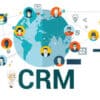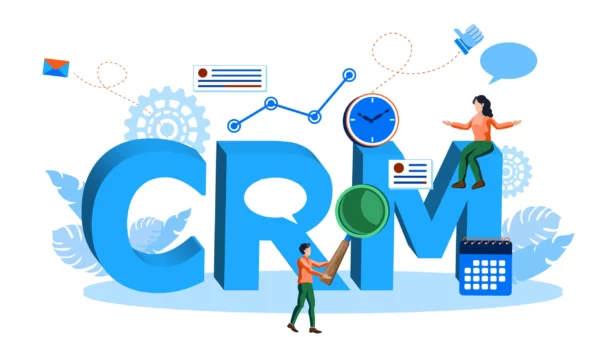Sales CRM (Customer Relationship Management) software is an essential tool for any business that sells products or services to customers. For one, it can help keep track of your customer interactions and sales process and make it more efficient.
However, with so many options, it’s not always clear which one is right for your company. The good news is that there are plenty of features available in these solutions. It’s just a matter of finding the ones that fit your company’s needs and requirements.
What Is Sales CRM Software?
As briefly mentioned earlier, sales CRM software is a system that can help you manage your clients and sales process more efficiently. It keeps track of all your leads, opportunities, and contacts and the people working on each deal. Additionally, it provides reports that can help you identify trends in your business, allowing you to make data-driven decisions.
The purpose of a sales CRM is to provide a single database that all sales organization members can use. It allows them to access the same information, regardless of where or what device they use. The database should include contacts, accounts, opportunities, and more information.
A good sales CRM will combine all the features you need for managing your sales pipeline with tools for managing your lead generation activities. It should also include reporting functionality to measure how well your campaigns perform. And finally, it should allow you to automate everyday tasks, so you don’t have to spend time doing things like sending out emails or scheduling meetings.
How To Compare Sales CRM Software

Comparing sales CRM software can be a daunting task, especially since there’s a wide range of options in the market, such as Microsoft Dynamics vs Salesforce. And to help guide you through this process, this article provides a simple guide on comparing sales CRM software before making a decision.
1. Outline Your Goals For The CRM
To determine whether a sales CRM is right for your business, you need a clear idea of what you want to accomplish. First, ask yourself: what are my goals? Do I want a system that allows me to segment customers by location or industry? Do I need a system that integrates with other software programs? Is it essential that the system is user-friendly? Or would I save money by using an older version of the same software my competitors use?
It’s crucial to think about what kind of goals your company has for its sales team and how those goals tie into the software you’re looking to invest in and use. Consider if the product fits into your short-term needs and long-term goals. With this, you won’t miss the mark when comparing sales CRM for your needs.
2. Functionality
It’s also essential to know what you need from your sales CRM Software. For instance, do you want something to help you track your prospective efforts? Or do you want something that will help with customer retention? Do you need something that’ll also manage your marketing campaigns? Or are you just looking for something basic to manage leads and opportunities?
Most systems are designed around four core functions: lead management, pipeline management, opportunity management, and reporting. Essentially, a lead management system allows you to store information about potential customers or clients in one place so that it’s easy to find later when they become leads. You can track their contact information, capture notes about past interactions with them, add related documents like contracts or signed contracts, and record any additional data from calls or emails sent back and forth with the potential customer.
On the other hand, a pipeline management system helps you keep track of all the steps involved in getting a deal closed, from initial outreach through contract negotiations and eventual close. Also, it makes sure nothing falls through the cracks along the way by automatically assigning tasks to specific people based on their roles within the company (e.g., sales rep).
Therefore, when comparing sales CRM software, functionality is crucial.
3. Ease Of Use
Ease of use is another factor to consider when choosing a sales CRM software. The best sales CRM software should be easy to use and even better if it has an intuitive interface. The ease of use should determine how quickly you can get up and running with the software, so you can focus on growing your business instead of figuring out how the software works or training your team.
4. Integration
When comparing a sales CRM software, it’s crucial to consider how well it integrates with your existing systems. Integration is the process of bringing data from one software system into another. It’s an essential part of any CRM implementation because it allows you to leverage all of your data for better insights and analysis. If you’re using two different CRM systems, integration can make it easier for you to keep track of everything that’s going on in your company.
5. Know Your Budget
Before investing in CRM software, you need to know how much they cost and what their inclusions are. This can help ensure you’re getting the right tool for your business.
On the other hand, knowing your budget is another crucial consideration when comparing sales CRM software. You don’t want to waste your time on an overkill system for your business or below par for what you’re trying to accomplish. You also don’t want to go too cheap because it’s generally not a good idea to skimp on the software that helps run your business.
You can find out how much different systems cost by shopping around for quotes from vendors. Remember that some vendors may charge extra for training or maintenance contracts, so make sure you factor those costs into your overall price tag before making a decision. Also, it’s crucial to consider any other costs associated with using that software, like maintenance fees and support contracts.
Wrapping Up
CRMs play a significant role in managing the sales and customer interaction aspect of your business. Therefore, it’s only essential to take your time in knowing and comparing your options to choose the best one and get the most of your money’s value.
And with the simple guidelines outlined in this article, hopefully, you’ll be able to make the right choice for your business.
Thanks for reading this article. If you're new here, why don't you subscribe for regular updates via RSS feed or via email. You can also subscribe by following @techsling on Twitter or becoming our fan on Facebook. Thanks for visiting!

























































































































































































